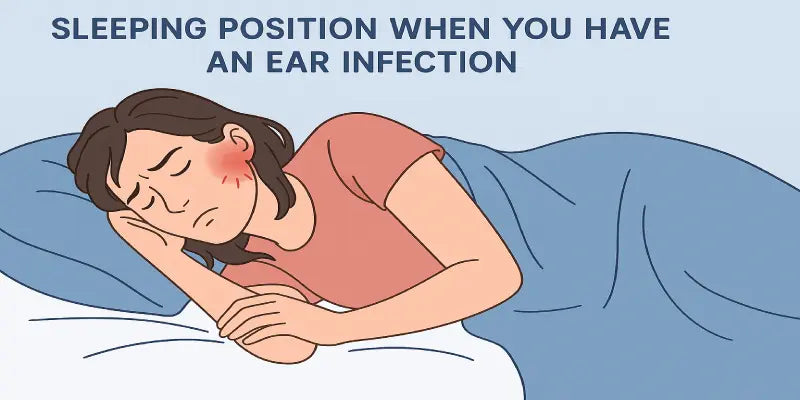
How to Manage When Your Partner Has a Different Sleeping Routine
For many couples, no matter how much they love each other and want to spend time together, sharing a bedroom can be difficult and stressful to balance. Your partner could be the reason you aren't getting enough sleep at night, which can lead to sleep deprivation, mood swings, and many other health issues in the long term.
Couple sleeping together with different schedules certainly can have problems. As an example, one partner can feel annoyed that they aren't spending enough time together at night because their partner goes to bed earlier than them, or one partner wants to watch one more episode of FRIENDS while the other is attempting to get some sleep.
In this blog, we’ll share some tips on how you can manage when your partner has a different sleep schedule than yours.
Understanding Your Partner's Needs
Your partner would have a different sleep schedule and that is perfectly fine. Every person has their unique sleep preferences and rhythms that can be influenced by various factors such as genetics, work schedules, and lifestyle choices. Take time to understand your partner’s needs and the reason behind why they have a different sleep schedule. Recognizing and acknowledging these differences is the first step toward finding a solution that works for both of you.
Open Communication is Key
As with most challenges in relationships, the first and possibly most important step is to just discuss what is coming up for each of you. Allow each other to be honest about how important it is for you to get a good night's sleep. While it is true that couples who sleep together have greater emotional and intimate connection, disrupting precious sleep by a partner can have the opposite effect, causing feelings of resentment and all of the consequences of sleep deprivation in the disturbed partner. The idea is to figure out what works best for you and your spouse in your current situation.
Finding Compromises that Work
If you and your partner’s sleeping schedules aren't drastically different, you can work together to find a solution and compromise where possible. This will not work if you are asleep by 10pm and your partner stays awake until 2 a.m. However, if your bedtimes range by an hour or so, you can be able to meet halfway and fall asleep fast at around the same time. Over the course of a week, move your bedtime by 10 minutes so that you stay up half an hour later and they go to bed half an hour earlier (or vice versa).
Respect and Consideration
When your sleep schedules don't match with each other, it's important to respect each other's space and boundaries. If one partner needs to sleep while the other is awake, be aware of noise levels and activities that can disturbed their sleep. You can consider investing in earplugs or white noise machines. Create designated quiet areas to sleep with partner, or use signs to help build a culture of mutual respect and esteem.
Prioritizing Quality Sleep
Sleep is an important part of everyone's life, it helps us function properly the whole day. Getting quality sleep is important for both yourself and your partner even if you both have different sleep schedules. Try to create a sleep-friendly environment, make sure your bedroom is comfortable, dark, and quiet. Invest in a supportive mattress and pillows to enhance sleep quality and wake up without stiffness or neck or back pain. Encourage each other to establish 10 healthy sleep habits, such as maintaining a consistent sleep schedule, avoiding stimulants like caffeine before bedtime, and winding down with relaxing activities.
Spend Quality Time Together
If you have a partner who has a different sleep schedule or you sleep separately for any reason, you could be missing out on certain aspects of the relationship, such as cuddling. In that scenario, spending warm time together, even if you don't sleep at the same time, can be beneficial. Plan activities that align with your overlapping awake hours, such as cooking dinner together, watching a movie, or enjoying a leisurely breakfast. These shared experiences not only strengthen your bond but also create cherished memories despite your differing schedules.
Seek Professional Guidance
If you feel that your different sleep schedules cause an impact on your relationship or affect your well-being, don't be afraid to seek expert help. A sleep specialist or couples therapist can provide tailored guidance and tactics to address root causes and enhance communication. They can offer advice on sleep hygiene, dispute resolution, and developing empathy and understanding in your relationship.
Conclusion: Navigate Different Sleep Routines Together
It takes patience, comprehension, and a willingness to make concessions to coexist with your partner when you have different sleep schedules. You can overcome this difficulty by discussing clearly, respecting each other's needs, and putting quality sleep first. Remember that perfect alignment is not the goal; rather, creating harmony and balance that works for both of you. With time, effort, and mutual support, you can gracefully navigate your different sleep schedules and form a happier, healthier connection.
If You or your partner find it's hard to fall asleep or have a stiff neck and back in the morning, these are the signs you must update your normal pillow with an advanced one. A memory foam pillow would be perfect for you and your partner as it promotes quality sleep and can be helpful in neck and back pain.








